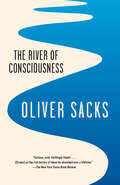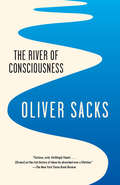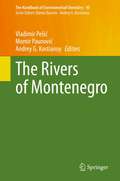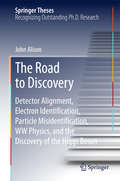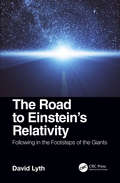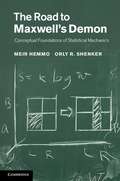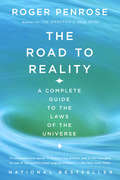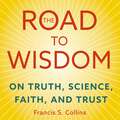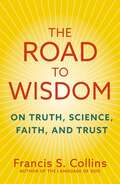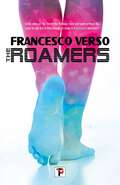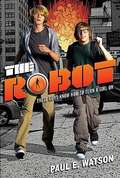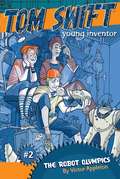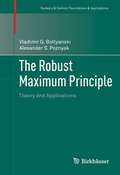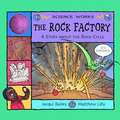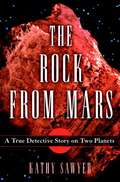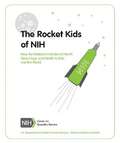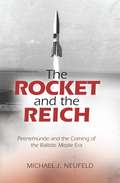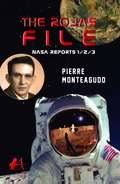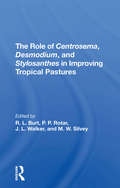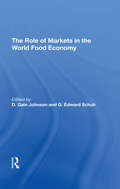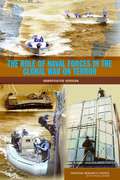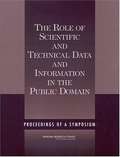- Table View
- List View
The River of Consciousness
by Oliver SacksA profoundly fascinating, illuminating major work from the beloved, bestselling thinker and neurologist Oliver Sacks--completed by him just before his death--provides readers with a compelling, rare gift from the master.The River of Consciousness reflects Oliver Sacks at his wisest and most humane, as he examines some of the human animal's most remarkable faculties: memory, creativity, consciousness, and our present, ongoing evolution. Before his death, Sacks personally collected into this one volume his recent essays and case studies, never before published in book form, which he felt best displayed his passionate engagement with his most compelling and seminal ideas. The book, lucid and accessible as ever, is a mirror of his own consciousness, discovering in his personal and humane interactions with others, unique insight, and fresh meaning. Featuring a preface written two weeks before his death, The River of Consciousness reveals the beloved, bestselling author's unique ability to make unexpected connections, his sheer joy in knowledge, and his unceasing, timeless project to understand what it is that makes us human.
The River of Consciousness
by Oliver SacksFrom the best-selling author of Gratitude, On the Move, and Musicophilia, a collection of essays that displays Oliver Sacks's passionate engagement with the most compelling and seminal ideas of human endeavor: evolution, creativity, memory, time, consciousness, and experience. Oliver Sacks, a scientist and a storyteller, is beloved by readers for the extraordinary neurological case histories (Awakenings, An Anthropologist on Mars) in which he introduced and explored many now familiar disorders--autism, Tourette's syndrome, face blindness, savant syndrome. He was also a memoirist who wrote with honesty and humor about the remarkable and strange encounters and experiences that shaped him (Uncle Tungsten, On the Move, Gratitude). Sacks, an Oxford-educated polymath, had a deep familiarity not only with literature and medicine but with botany, animal anatomy, chemistry, the history of science, philosophy, and psychology. The River of Consciousness is one of two books Sacks was working on up to his death, and it reveals his ability to make unexpected connections, his sheer joy in knowledge, and his unceasing, timeless project to understand what makes us human.
The Rivers of Montenegro (The Handbook of Environmental Chemistry #93)
by Andrey G. Kostianoy Momir Paunović Vladimir PešićThis book reviews the current state of knowledge on, recent advances in, and future prospects of Montenegrin river basins in the context of anthropogenic activities. Edited by three respected experts in the field, the book begins with an introduction to the specific hydrogeological conditions in Montenegro and critical reflections on the impact of hydropower projects. It then reviews the vulnerability of river ecosystems, exploring potential genotoxic effects and water quality, and explaining typology and monitoring of these aspects, and particularly highlighting mollusk assemblages and monitoring of intermittent rivers. The closing chapters focus on the impact of river flooding and discuss controversial projects aiming to find an approach mutually acceptable to all stakeholders. Given its scope, the book is an indispensable resource for scientists in academia and the water industry, as well as for decision-makers in the field investigating the interactions between land and water, limnology and biota, and natural and cultural resources.
The Road to Discovery
by John AlisonThe research presented here includes important contributions on the commissioning of the ATLAS experiment and the discovery of the Higgs boson. The thesis describes essential work on the alignment of the inner tracker during the commissioning of the experiment and development of the electron identification algorithm. The subsequent analysis focuses on the search for the Higgs boson in the WW channel, including the development of a method to model the critical W+jet background. In addition, the thesis provides excellent introductions, suitable for non-specialists, to Higgs physics, to the LHC, and to the ATLAS experiment.
The Road to Einstein's Relativity: Following in the Footsteps of the Giants
by David LythCHOICE Highly Recommended Title, August 2019 <P><P>Expertly guided by renowned cosmologist Dr. David Lyth, learn about the pioneering scientists whose work provided the foundation for Einstein’s formulation of his theories of relativity, and about Einstein's groundbreaking life and work as well. <P><P>This highly readable and accessible panorama of the field delicately balances history and science as it takes the reader on an adventure through the centuries. Without complex mathematics or scientific formulae, this book will be of interest to all, even those without a scientific background, who are intrigued to find out more about what paved the way for one of our most famous physicists to push the boundaries of physics to new lengths. <P><P>Features: <li>Written by an internationally renowned physicist and cosmologist <li>Describes the life and times of Einstein and his important predecessors <li>Focuses on one of the most famous areas of science, Einstein’s Relativity Theory
The Road to Maxwell's Demon
by Meir Hemmo Orly R. ShenkerTime asymmetric phenomena are successfully predicted by statistical mechanics. Yet the foundations of this theory are surprisingly shaky. Its explanation for the ease of mixing milk with coffee is incomplete, and even implies that un-mixing them should be just as easy. In this book the authors develop a new conceptual foundation for statistical mechanics that addresses this difficulty. Explaining the notions of macrostates, probability, measurement, memory, and the arrow of time in statistical mechanics, they reach the startling conclusion that Maxwell's Demon, the famous perpetuum mobile, is consistent with the fundamental physical laws. Mathematical treatments are avoided where possible, and instead the authors use novel diagrams to illustrate the text. This is a fascinating book for graduate students and researchers interested in the foundations and philosophy of physics.
The Road to Reality: A Complete Guide to the Laws of the Universe
by Roger PenroseFrom one of our greatest living scientists, a magnificent book that provides, for the serious lay reader, the most comprehensive and sophisticated account we have yet had of the physical universe and the essentials of its underlying mathematical theory.Since the earliest efforts of the ancient Greeks to find order amid the chaos around us, there has been continual accelerated progress toward understanding the laws that govern our universe. And the particularly important advances made by means of the revolutionary theories of relativity and quantum mechanics have deeply altered our vision of the cosmos and provided us with models of unprecedented accuracy. What Roger Penrose so brilliantly accomplishes in this book is threefold. First, he gives us an overall narrative description of our present understanding of the universe and its physical behaviors–from the unseeable, minuscule movement of the subatomic particle to the journeys of the planets and the stars in the vastness of time and space.Second, he evokes the extraordinary beauty that lies in the mysterious and profound relationships between these physical behaviors and the subtle mathematical ideas that explain and interpret them. Third, Penrose comes to the arresting conclusion–as he explores the compatibility of the two grand classic theories of modern physics–that Einstein’s general theory of relativity stands firm while quantum theory, as presently constituted, still needs refashioning.Along the way, he talks about a wealth of issues, controversies, and phenomena; about the roles of various kinds of numbers in physics, ideas of calculus and modern geometry, visions of infinity, the big bang, black holes, the profound challenge of the second law of thermodynamics, string and M theory, loop quantum gravity, twistors, and educated guesses about science in the near future. In The Road to Reality he has given us a work of enormous scope, intention, and achievement–a complete and essential work of science
The Road to Wisdom: On Truth, Science, Faith and Trust
by Francis S. CollinsFrom world-leading scientist and New York Times bestselling author of The Language of God, a deeply thoughtful guidebook to discerning what and who we can trust to move us from societal discord to civic harmony.As the COVID-19 pandemic revealed, western society has become not just hyper-partisan, but also deeply cynical; distrustful of traditional sources of knowledge and wisdom such as science and faith. Scepticism about vaccines led to the needless deaths of at least 230,000 Americans, and "Do your own research" is now a rallying cry in many online rabbit holes. Yes, experts can make mistakes, and institutions can lose their moral compass, but there are reliable ways and means to weigh information and navigate truth, and The Road to Wisdom is here to help us rediscover them.Francis Collins reminds us of the four core sources of judgement and clear thinking: truth, science, faith, and trust. Drawing on his scientific work at the forefront of the Human Genome Project and the US National Institutes of Health, as well as on ethics, philosophy, and theology, Collins makes a robust, thoughtful case for each of these sources - their reliability, and their limits. Ultimately, he shows how they work together, not separately - and certainly not in conflict. It is only when we re-link these four pillars of wisdom that we can begin to discern the best path forward in life.Hopeful, accessible, winsome, and deeply wise, The Road to Wisdom leads us beyond current animosities to surer footing. Here is the moral, philosophical, and scientific framework with which to address the problems of our time - on the world stage, but also in our daily lives.
The Road to Wisdom: On Truth, Science, Faith and Trust
by Francis S. CollinsFrom world-leading scientist and New York Times bestselling author of The Language of God, a deeply thoughtful guidebook to discerning what and who we can trust to move us from societal discord to civic harmony.As the COVID-19 pandemic revealed, western society has become not just hyper-partisan, but also deeply cynical; distrustful of traditional sources of knowledge and wisdom such as science and faith. Scepticism about vaccines led to the needless deaths of at least 230,000 Americans, and "Do your own research" is now a rallying cry in many online rabbit holes. Yes, experts can make mistakes, and institutions can lose their moral compass, but there are reliable ways and means to weigh information and navigate truth, and The Road to Wisdom is here to help us rediscover them.Francis Collins reminds us of the four core sources of judgement and clear thinking: truth, science, faith, and trust. Drawing on his scientific work at the forefront of the Human Genome Project and the US National Institutes of Health, as well as on ethics, philosophy, and theology, Collins makes a robust, thoughtful case for each of these sources - their reliability, and their limits. Ultimately, he shows how they work together, not separately - and certainly not in conflict. It is only when we re-link these four pillars of wisdom that we can begin to discern the best path forward in life.Hopeful, accessible, winsome, and deeply wise, The Road to Wisdom leads us beyond current animosities to surer footing. Here is the moral, philosophical, and scientific framework with which to address the problems of our time - on the world stage, but also in our daily lives.
The Roamers
by Francesco VersoFrom the award winning future-thinker comes a Solar Punk novel packed with near-future ideas from the streets of Rome, with elements of David Mitchell's Cloud Atlas and Into the Wild by Jon KrakauerThe pulldogs, a group of people at the twilight of Western civilisation, undergo an anthropological transformation caused by the dissemination of nanites (nanorobots capable of assembling molecules to create matter). This technology changes the way they eat and gives rise to a culture which, while reminiscent of an ancient nomadic society, is creative and new. Liberation from the imperative of food, combined with the ability to 3D print objects and use cloud computing, makes it possible for the pulldogs to make a choice that seems impossible and anachronistic – a new life, but is it really an Arcadia?FLAME TREE PRESS is the imprint of long-standing Independent Flame Tree Publishing, dedicated to full-length original fiction in the horror and suspense, science fiction & fantasy, and crime / mystery / thriller categories. The list brings together fantastic new authors and the more established; the award winners, and exciting, original voices. Learn more about Flame Tree Press at www.flametreepress.com and connect on social media @FlameTreePress.
The Robot
by Paul WatsonScience-loving Gabe and girl-crazy Dover are best friends. In fact, they're practically each other's only friends. <P><P>So when Gabe's parents leave town for the weekend, he lets Dover convince him to break into his father's basement laboratory-even though he knows it's off-limits under penalty of lifelong grounding. Once inside, the boys make a shocking discovery, one that will turn a boring weekend into a hilarious madcap adventure: a smoking hot robot! While Gabe and Dover argue over "Trina," the robot flees the lab. The chase is on! Before the day is over, she'll expose a traitorous plot, catapult two geeky freshmen to high school fame, and try to assassinate Dr. Phil!
The Robot Olympics (Tom Swift, Young Inventor #2)
by Victor AppletonROBOTS + TERRORISTS = TROUBLE FOR TOM Tom's been training his entry, SwiftBot, for the upcoming Robot Olympics -- a major event being sponsored by the White House's Office of Science and Technology. Teenage inventors from around the country will be bringing their homemade robots to compete in a series of athletic competitions. The Road Back, an antiscience terrorist group, has issued a statement condemning the event, and Tom hopes that the tight security at the Robot Olympics will keep TRB from causing trouble. But no such luck. Someone is playing dirty . . . and things are going to get dangerous.
The Robust Maximum Principle: Foundations And Applications: Robust Maximum Principle: Theory And Applications (Systems And Control: Foundations And Applications Ser.)
by Vladimir G. Boltyanski Alexander S. PoznyakCovering some of the key areas of optimal control theory (OCT), a rapidly expanding field, the authors use new methods to set out a version of OCT's more refined 'maximum principle.' The results obtained have applications in production planning, reinsurance-dividend management, multi-model sliding mode control, and multi-model differential games. This book explores material that will be of great interest to post-graduate students, researchers, and practitioners in applied mathematics and engineering, particularly in the area of systems and control.
The Rock Factory: The Story About the Rock Cycle (Science Works)
by Jacqui Bailey Matthew LillyDescribes how stones form inside the earth, work their way to the surface, and eventually are found by a young boy.
The Rock From Mars
by Kathy SawyerIn this riveting book, acclaimed journalist Kathy Sawyer reveals the deepest mysteries of space and some of the most disturbing truths on Earth. The Rock from Mars is the story of how two planets and the spheres of politics and science all collided at the end of the twentieth century. It began sixteen million years ago. An asteroid crashing into Mars sent fragments flying into space and, eons later, one was pulled by the Earth’s gravity onto an icy wilderness near the southern pole. There, in 1984, a...
The Rocket Kids of NIH
by Don LuckettFifty-two years ago, members of a review committee at the National Institutes of Health dug into their wallets and purses to give a "grant" to a 9-year-old boy named Terence Boylan of Snyder, N.Y. His energetic request for $10 to build a rocket ship with his 14-year old friend Bruce Cook moved distinguished members of this NIH committee to invest in the future.
The Rocket Kids of NIH
by Don LuckettFifty-two years ago, members of a review committee at the National Institutes of Health dug into their wallets and purses to give a "grant" to a 9-year-old boy named Terence Boylan of Snyder, N.Y. His energetic request for $10 to build a rocket ship with his 14-year old friend Bruce Cook moved distinguished members of this NIH committee to invest in the future. Bookshare demo title.
The Rocket and the Reich: Peenemunde and the Coming of the Ballistic Missile Era
by Michael J. NeufeldWINNER OF THE DEXTER PRIZE OF THE SOCIETY FOR THE HISTORY OF TECHNOLOGY Launched by the Third Reich in late 1944, the first ballistic missile, the V-2, fell on London, Paris, and Antwerp after covering nearly two hundred miles in five minutes. It was a stunning achievement, one that heralded a new age of ballistic missiles and space launch vehicles. Michael J. Neufeld gives the first comprehensive and accurate account of the story behind one of the greatest engineering feats of World War II. At a time when rockets were minor battlefield weapons, Germany ushered in a new form of warfare that would bequeath a long legacy of terror to the Cold War, as well as the means to go into space. Both the US and USSR's rocket programs had their origins in the Nazi state.
The Rojas File
by Luc Wyn Pierre MonteagudoBook description: Mystery and secrecy come to light after 5 decades in an exciting story which reveals the complot to hide the inventions and discoveries of Doctor Rojas, a key scientist behind the landing of mankind on the moon. In the middle of the “Cold War” and while he was working for NASA, Doctor Rojas met with a president, travelled to the former Soviet Union, took the fateful decision to agree to an interview in Washington D.C. and afterward, what happened? The parties involved claim not to have any knowledge of him, but the truth is that this story is based on real events. While the 50th anniversary of the first manned landing on the moon approaches, we are presented with this fascinating book, which consists of two parts For starters it’s a tribute to the posthumous memory of astrophysicist Héctor. R. Rojas, who was able to travel to the moon on secret NASA flights, and in the second part, the author presents his lifelong thoughts about the UFO phenomenon. Without a doubt it’s an exciting story, written in simple and direct language.
The Role Of Centrosema, Desmodium, And Stylosanthes In Improving Tropical Pastures
by Peter P Rotar Robert L Burt J. L. Walker M. W. SilveyThis integrated collection describes the importance of forage legumes for pasture development and improvement in the tropics and subtropics. Leading agronomists review the magnitude of the need for pasture improvement; tropical and subtropical soil and climate environments; reports of the successful use of legumes in pasture development in a wet and a dry tropical environment; and the scope of the problem in terms of area to be developed and development logistics required. Three legume genera, Centrosema, Desmodium, and Stylosanthes, are discussed in detail--information is presented on taxonomy, adaptation, distribution, productivity, and usefulness--and considerable emphasis is placed on Rhizobium germplasm resources for these genera. A concluding section of technical essays addresses special considerations in using tropical legumes in pasture development and presents a coordinated multidisciplinary approach to legume exploration and evaluation.
The Role Of Markets In The World Food Economy
by D. Gale Johnson G. Edward SchuhThis book extends the discussion of world food problems by giving explicit recognition to the potential role of markets. The authors highlight the contribution of prices to the solution of food problems in low-income countries, for example, by providing adequate incentives to farmers to expand production, assuring that food supplies can be obtained through trade when needed and giving appropriate signals to consumers. They also document the negative effects on food supply and national welfare of the actual price policies of many Third World governments. While recognizing the problems involved in defining and measuring hunger, as well as in improving the food supply, the authors consider the outlook for future food availability as favorable in terms of continued modest improvement in per capita food supplies at prices, adjusted for inflation, that are likely to continue the slow decline of recent decades. One focus of their comments is the positive roles that governments can and should play in the world food economy, especially in support of research, creation of human capital, and provision of appropriate rural infrastructure.
The Role Of Naval Forces In The Global War On Terror
by National Research Council of the National AcademiesThe growth of the terrorism threat to the nation’s security has created significant strategic challenges for U.S. armed forces in fighting this global war on terrorism (GWOT). For the Navy, the challenges have centered on developing maritime capabilities to prosecute the GWOT as far forward as possible. To assist the Navy’s planning in this area, the former Chief of Naval Operations requested the NRC to conduct an assessment of the adequacy of and prospects for improving the role of Naval Forces in the GWOT. The study developed a defense-in-depth framework as the organizing principle for the report. The report contains information as described in 5 U.S.C. 552(b) and therefore could not be released to the public in its entirety. The public version consists of an executive summary that presents an assessment of the transformation of naval forces for addressing the GWOT; a brief description of the defense-in-depth framework; and a list of findings and major recommendations.
The Role Of Scientific And Technical Data And Information In The Public Domain: Proceedings Of A Symposium
by National Research Council Staff Role of Scientific and Technical Data and Information in the Public Domain Steering Committee International Scientific and Technical Information Programs OfficeThis symposium brought together leading experts and managers from the public and private sectors who are involved in the creation, dissemination, and use of scientific and technical data and information (STI) to: (1) describe and discuss the role and the benefits and costs--both economic and other--of the public domain in STI in the research and education context, (2) to identify and analyze the legal, economic, and technological pressures on the public domain in STI in research and education, (3) describe and discuss existing and proposed approaches to preserving the public domain in STI in the United States, and (4) identify issues that may require further analysis.
The Role Of Scientific And Technical Data And Information In The Public Domain: Proceedings Of A Symposium
by National Research Council of the National AcademiesThis symposium brought together leading experts and managers from the public and private sectors who are involved in the creation, dissemination, and use of scientific and technical data and information (STI) to: (1) describe and discuss the role and the benefits and costs--both economic and other--of the public domain in STI in the research and education context, (2) to identify and analyze the legal, economic, and technological pressures on the public domain in STI in research and education, (3) describe and discuss existing and proposed approaches to preserving the public domain in STI in the United States, and (4) identify issues that may require further analysis.
The Role of Antioxidants in Longevity and Age-Related Diseases
by Bee Ling Tan Mohd Esa NorhaizanThe average life expectancy has increased worldwide in the recent decades. This has presented new challenges as old age brings the onset of diseases such as cancer, neurodegenerative disorders, cardiovascular disease, type 2 diabetes, arthritis, osteoporosis, stroke, and Alzheimer’s disease. Studies and research have shown the potential preventive and therapeutic roles of antioxidants in aging and age-related diseases by inhibiting the formation or disrupting the propagation of free radicals and thus increasing healthy longevity, enhancing immune function, and decreasing oxidative stress. This has made an antioxidant rich diet of increasing importance in battling the detrimental effects of the aging process.“The Role of Antioxidants in Longevity and Age-Related Diseases” is the book that compiles research on antioxidants and their biological mechanisms that mediate age-related diseases. This book covers the major issues linked to antioxidants, aging, and age-related diseases, including changes in organ systems over the lifespan, age-related oxidative stress-induced redox imbalance, inflammaging, implications of inflammation in aging and age-related diseases, and the important role of antioxidant-rich foods in their prevention and treatment of various age-related diseases. For researchers seeking a comprehensive single source on antioxidants and their roles in aging and age-related diseases, this novel text provides an up-to-date overview.
